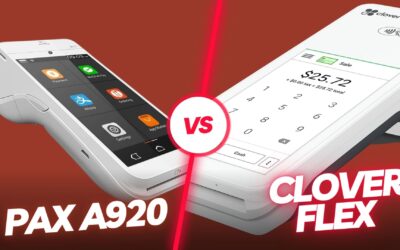
Dejavoo vs PAX: Choosing the Right Payment Terminal for Your Business
Written by: Zac Rogers
Compare Dejavoo vs PAX payment terminals to find the best fit for your business. Explore features, costs, and user benefits to make an informed choice.
In today’s fast-moving digital economy, seamless payment processing is more than a convenience — it’s a competitive necessity. Whether you run a bustling retail store, a fine-dining restaurant, or an on-the-go mobile business, your choice of payment terminal directly influences customer satisfaction, transaction speed, and business efficiency. Among the leading contenders in the point-of-sale (POS) technology market, Dejavoo and PAX stand out as two of the most trusted and feature-rich options.
Both brands offer advanced hardware, security compliance, and integration flexibility — but they serve slightly different business needs. This article dives deep into the Dejavoo vs PAX comparison, helping merchants determine which solution best fits their operations, budget, and long-term goals.
Dejavoo and PAX in the Payment Industry
Dejavoo Systems, founded in 2006, quickly gained popularity for its user-friendly terminals, robust Linux architecture, and strong integration capabilities with POS systems and payment gateways. Dejavoo devices are built with simplicity and merchant convenience in mind, featuring practical tools like a built-in loyalty program, electronic receipts, and 24/7 support via the “Call Me” button.
PAX Technology, established in 2001, is a global leader in smart POS and Android-based payment devices. Known for innovation and design, PAX has millions of terminals deployed worldwide and is the go-to choice for many large retailers and payment service providers. Their devices offer advanced customization, larger touchscreens, and access to the MAXSTORE app marketplace for added business applications.
While both companies prioritize speed, security, and flexibility, their products cater to slightly different audiences: Dejavoo excels in simplicity and affordability, while PAX dominates in intelligent, feature-rich Android POS systems.
Dejavoo Payment Terminals: Practical, Reliable, and Merchant-Friendly
Dejavoo’s product line — including the Z8, Z9, Z11, Z1, Z6, and the newer QD series — offers merchants a versatile range of solutions for countertop, mobile, and integrated environments.
1. Linux-Based Reliability
All Dejavoo terminals operate on a secure Linux open-architecture platform, ensuring stability and compatibility with multiple applications. This design allows easy integration with Dejavoo’s DeNovo Business Portal, which gives merchants real-time batch updates, remote software downloads, and digital receipt management.
2. Key Features
Universal Payment Support: Accepts EMV chip, NFC (contactless), and magnetic stripe transactions.
Security: PCI PTS, EMV Level 1 and 2, Visa PayWave, MasterCard PayPass, Amex, and JCB certified.
Built-In Loyalty and Rewards: Eliminates the need for external loyalty programs or cards.
Connectivity: Models offer dual or tri-comm options — dial, Ethernet, WiFi, Bluetooth, and 4G connectivity.
User-Friendly Interface: Simple navigation with colorful displays and quick “Favorites” menus.
3. Notable Models
Dejavoo Z8: Compact countertop terminal with tri-comm capability. Ideal for small to medium retail and restaurant setups.
Dejavoo Z9: Wireless model offering 3G, WiFi, and Bluetooth connections — perfect for mobile merchants or pay-at-the-table environments.
Dejavoo Z11: Combines the large touchscreen of the Z9 with the countertop convenience of the Z8.
Dejavoo QD Series: Android-based line (QD1, QD2, QD4) offering enhanced graphics, faster processors, and expanded functionality for modern businesses.
4. Ideal Use Cases
Dejavoo terminals are perfect for:
- Independent retailers and restaurants needing dependable countertop terminals
- Service-based businesses requiring wireless mobility (e.g., delivery, salons, repair services)
- Merchants seeking easy integration with existing POS software
5. Pros and Cons
Pros:
- Affordable, compact, and easy to use
- Built-in loyalty tools and remote management
- Wide range of connectivity options
- Excellent customer support
Cons:
- Linux OS is not as flexible as Android for app installations.
- Smaller screens on older Z-series models
PAX Payment Terminals: Smart, Scalable, and Future-Ready
PAX Technology is synonymous with Android-powered smart terminals that combine payment functionality with business intelligence. The company’s broad range — from mobile mPOS units like the A50 to full-featured countertop systems like the A920MAX — caters to every industry segment.
1. Android Ecosystem Advantage
PAX devices run on Android OS, allowing access to the MAXSTORE platform, where merchants can download apps for inventory management, analytics, customer engagement, and more. This turns the terminal into a mini business hub rather than just a payment processor.
2. Key Features
Advanced Hardware: Larger HD displays, faster processors, and powerful batteries for all-day use.
Omnichannel Payment Support: Accepts EMV, contactless, QR, and mobile wallet payments (Apple Pay, Google Pay, Samsung Pay).
Cloud-Based Management: Remote software updates, monitoring, and analytics for business insights.
Security & Compliance: Fully PCI PTS, EMV, and contactless certified with tokenization and encryption.
Custom Branding: Businesses can display their logos, animations, or promotional messages on idle screens.
3. Notable Models
PAX A35: Compact Android countertop device with vibrant touch display and app capabilities.
PAX A50: Ultra-slim mPOS terminal for mobile businesses and on-the-go payments.
PAX A920MAX: Premium SmartPOS with large screen, fast processor, and 4G/WiFi connectivity.
PAX IM30: Unattended all-in-one payment terminal for kiosks, vending, or outdoor environments.
4. Ideal Use Cases
PAX devices are best suited for:
- Mid to large-scale businesses seeking multi-functional smart POS systems
- Enterprises requiring detailed analytics and app-based integrations
- Restaurants, hotels, and retailers offering pay-at-table or self-service kiosks
5. Pros and Cons
Pros:
- Android flexibility and app ecosystem
- High-end design and HD touchscreens
- MAXSTORE platform for remote control and insights
- Suitable for enterprise-scale deployments
Cons:
- Higher cost compared to basic Linux terminals
- Slightly steeper learning curve for small merchants
Which One Should You Choose?
Choosing between Dejavoo and PAX depends largely on your business model, transaction volume, and technology preferences:
Choose Dejavoo If:
- You want a cost-effective, plug-and-play terminal.
- Your business focuses on quick checkout transactions.
- You prefer straightforward integration and built-in loyalty tools.
- You operate in retail, restaurants, or local services with limited mobility needs.
Choose PAX If:
- You need a smart POS system with Android flexibility.
- You want real-time insights, data analytics, and advanced app integration.
- Your operations demand scalability, remote management, and customization.
- You run a larger or multi-location business that benefits from digital transformation.
- In short, Dejavoo is ideal for simplicity and reliability, while PAX is perfect for innovation and scalability.
Final Thoughts
Both Dejavoo and PAX have proven to be leaders in modern payment technology. Dejavoo terminals shine for their practicality, affordability, and merchant-focused tools, making them perfect for small and mid-sized businesses looking for secure and reliable payment processing. On the other hand, PAX’s Android-powered smart terminals redefine what’s possible at the point of sale — merging payments, apps, and analytics into a single intelligent platform.
At PayWavez, we understand that no two businesses are the same. Whether you’re drawn to Dejavoo’s dependable simplicity or PAX’s cutting-edge innovation, the right payment system can transform your checkout experience, strengthen customer loyalty, and drive long-term growth.
Subscribe
Winning with PayWavez
Our Blog
Unlock 2026’s Fastest Cash Advance with PayWavez
Written by: Zac Rogers Need a fast cash advance? Get flexible business funding with no long bank delays. Apply online and access capital quickly.In January 2026's credit crunch (6.75% prime rates, 40% bank rejections), traditional loans crushed SMBs demanding 625+...
Business Loans for Small and Medium Businesses in 2026
Written by: Zac Rogers Explore flexible business loans with fast approvals, transparent terms, and funding based on real cash flow. Grow your business with confidence in 2026.In 2026, most “business loan” approvals come down to one simple question: Can your business...
PAX A920 vs Clover Flex: The Ultimate 2026 Auto Shop POS Guide
Written by: Zac Rogers Upgrade your business with a modern auto shop POS. Perfect for repair shops, tire stores, and service centers across the USA.This guide is for auto shop POS and tire shop owners and counter managers who are tired of fragile tablets, high fees,...




